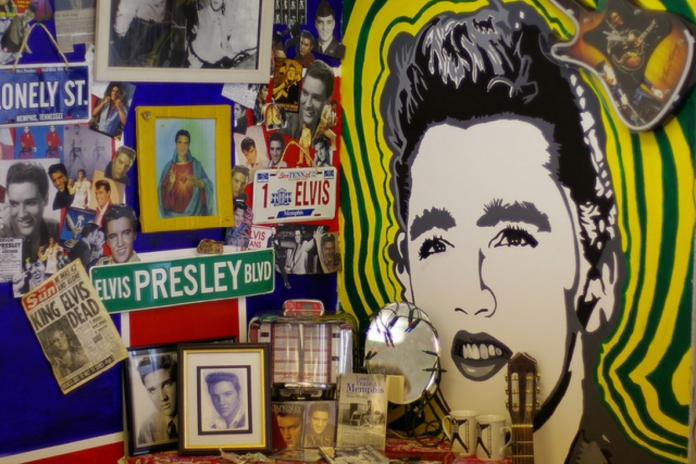Gregory L. Reece.
Comparisons Between Elvis Fans And Religious Pilgrims
The cultural phenomena surrounding Graceland, particularly the candlelight vigil commemorating Elvis’ death, have prompted some to draw direct parallels between Elvis fans and religious pilgrims. Ted Harrison, in his book “Elvis People: The Cult of the King” published in 1992, suggests that the behaviors and rituals exhibited by Elvis fans resemble those of a cult, hinting at the possibility of the Elvis cult evolving into a fully-fledged religion.
Harrison’s identification of several aspects of the Elvis cult has been the subject of widespread discussion in both serious journalism and academic scholarship. Additionally, the media has sensationalized and parodied these aspects.
Also Read: The Buttons Call To Memory
Characteristics Of The Elvis Cult
Several characteristics define the Elvis cult. First, Elvis is revered as the ‘King,’ a term with religious connotations akin to Jesus being called the ‘King of Kings’ in Christianity. Second, fans narrate Elvis’s life story similar to early Christians recounting the story of Jesus and writing gospels. This storytelling includes tales of Elvis’s generosity, such as giving away Cadillacs, his kindness to his mother, and his religious faith.
Third, fans consider certain objects associated with Elvis as sacred relics and icons. They collect memorabilia, including items from his personal life, such as toenails and used water cups. Fourth, Elvis impersonators serve as a priesthood for fans, donning religious attire and embodying Elvis’s spirit through performances. Fifth, fans engage in charitable activities in Elvis’s name.
Sixth, Elvis is believed to be alive even after his death—some attribute this existence to a spiritual presence, while others claim to have seen him physically alive. This assertion parallels the debates among early followers of Jesus regarding the nature of his resurrection. Seventh, Elvis enthusiasts often visit hospitals in the Memphis area. Additionally, fans undertake pilgrimages to Elvis’s shrines, such as his birthplace in Tupelo, Mississippi, and Graceland in Memphis, Tennessee. Graceland holds particular significance as it is where Elvis is buried and serves as the focal point for the central ritual of the Elvis cult, the candlelight vigil.
Elvis Devotion: A Modern American Religion
Other authors, such as John Strausbaugh, have echoed Harrison’s assertions about Elvis fans, suggesting they’re forming a distinctly American religion akin to Black Islam or Mormonism. Strausbaugh, like Harrison, points to various aspects of Elvis’s devotion that bolster this notion. While some of Strausbaugh’s arguments mirror Harrison’s observations on the social conduct of Elvis enthusiasts, he also delves into the specific beliefs fans hold about Elvis. According to Strausbaugh, Elvis devotees believe that:
- Fans perceive Elvis as a legendary figure, having departed from them but believed to be alive in some spiritual sense.
- He is considered a supernatural entity who continues to oversee his devotees from a higher realm and is capable of interceding on their behalf.
- The essence of Elvis is said to have been unveiled through accounts of remarkable healings and spiritual visions.
- There’s an expectation among followers that Elvis will either make a comeback to earth or be reunited with his faithful in the afterlife. (Strausbaugh, 1995: 11-12)
The Significance Of Graceland In The Elvis Phenomenon
According to Harrison and Strausbaugh, Graceland stands as the focal point of Elvis’s devotion, serving as the axis mundi of the Elvis world. It embodies multiple layers of significance: being Elvis’s residence, the site of his passing, and his final resting place. Moreover, it functions as a global meeting ground for Elvis enthusiasts, hosting deeply heartfelt tributes to the King.
An Elvis researcher, Erika Doss shares this view of Graceland’s central role in shaping the Elvis religion. However, she highlights a significant challenge associated with this perspective. Despite its profound importance to Elvis’s followers and visitors from around the globe, many would hesitate to characterize Graceland explicitly as a religious shrine.
While terms like “pilgrimage” and “shrine” are typically not commonly used by the average visitor to Graceland, many Elvis fans might find such terminology offensive if applied to their visits to the site. Nevertheless, despite the reluctance to adopt religious language, Elvis’s estate has evolved into a revered destination for thousands of fans who make the pilgrimage annually and many others who aspire to visit Graceland. (Doss, 1999: 85-86)
Interpreting Graceland: The Challenge Of Religious Connotations
Erika Doss acknowledges the reluctance of most fans and visitors to Graceland to accept interpretations that frame the estate as a shrine or sacred space. Despite this, she maintains the validity of such interpretations. This discrepancy poses a recurring challenge in her analysis.
For instance, she observes that fans engage in specific rituals during Elvis-related events, although many fans may not recognize these activities as rituals. Doss provides a comprehensive list of these cultic observances, surpassing Harrison or Strausbaugh’s descriptions. This detailed inventory sheds light on the core rituals central to Elvis’s faith. We are told that Elvis fans:
- Take the Graceland tour.
- Attend fan club meetings and collectors auctions.
- Engage in charity work.
- Attend benefit concerts for local hospitals.
- Donate blood to the Elvis Presley Trauma Center.
- Attend lectures and memorial services.
- Attend impersonator contests.
- Visit local landmarks associated with Elvis.
- Write on the Graceland wall.
- Drink iced tea at the Graceland Plaza restaurant.
- Eat at the Shoney’s fried chicken buffet down the street from Graceland (Doss 1999: 91-92)
Questioning The Religious Interpretation Of Graceland
The provided list of activities at Graceland during Elvis-related events seems unconvincing in demonstrating them as religious rituals, especially when participants themselves reject such interpretations. The described activities resemble those found at academic conferences or enthusiast conventions rather than religious ceremonies.
While it’s true that dedicated fans engage in similar events annually, labeling them as rituals stretches the definition too far. If one were to consider these activities as qualifying as religious rituals, then countless other gatherings, such as those of accountants, comic-book enthusiasts, academics, or booksellers, could also be considered religious.
This broadening of the term “ritual” renders it almost meaningless in identifying religious phenomena. Consequently, there remains doubt regarding the validity of the religious hypothesis and the notion of a nascent cult or religion forming at Graceland.
Gregory L. Reece, an independent writer and scholar based in Alabama, focuses on studying new religious movements and cult beliefs. His book titles include “UFO Religion,” “Weird Science,” “Creatures of the Night,” and “Elvis Religion,” from which this extract is taken.


